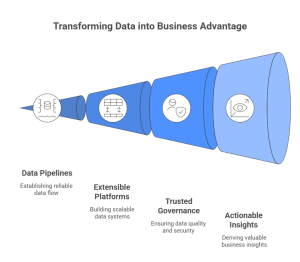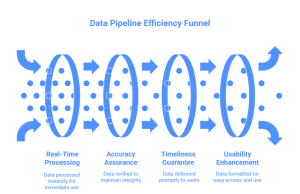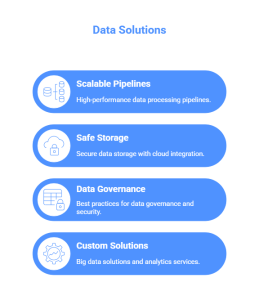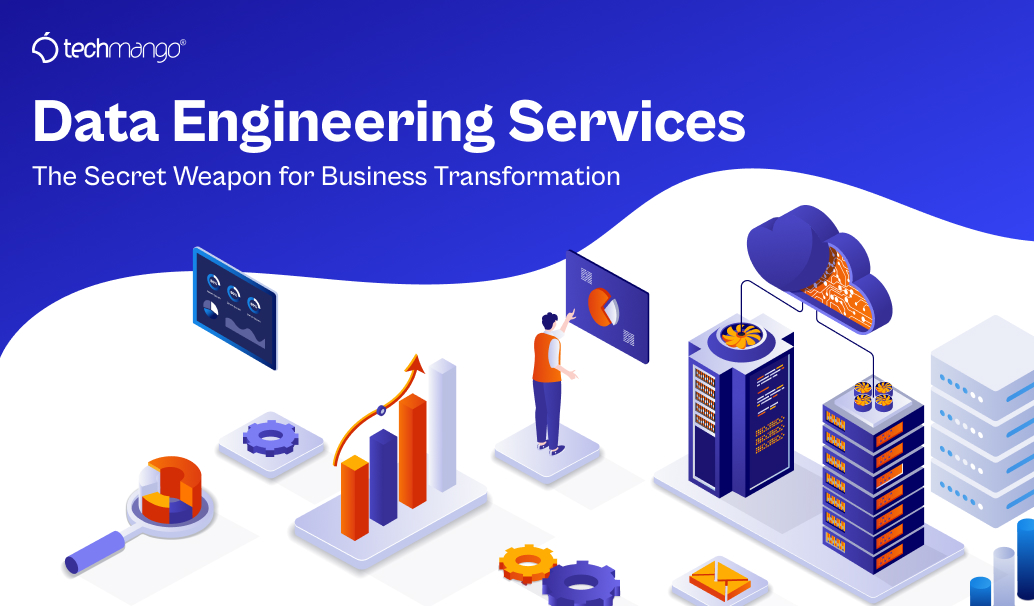Introduction – Why Data is the New Growth Engine?
A recent McKinsey study showed that firms that use data strategies are 19 times more likely to make a profit. This indicates that companies seeing data as a strategic asset are realizing measurable advantages with respect to growth, making data informed decisions, and competitiveness.
Data engineering services are the enabling force behind this transformation—the establishment of reliable pipelines, extensible platforms, and trusted governance that take raw data to actionable insights. 
What Are Data Engineering Services?
Data engineering services mean designing, developing and managing systems to convert raw data into actionable information. From building useful data pipelines to allowing data to be stored in a scalable way, organizations will have access to structured, useful, and reliable data. Cloud-based solutions, enforceable data governance, and focused data security allows organizations to enforce better decision-making and innovation.
Core Components of Modern Data Engineering
Building Scalable Data Pipelines
High-performing data pipelines move information across systems in real time. They help enterprises handle massive transaction volumes while ensuring data remains accurate, timely, and usable.
Data Storage and Cloud Integration
Flexible data storage is essential as volumes expand. Through cloud integration, enterprises increase capacity, optimize costs, and deliver global access without compromising speed or reliability.
Data Quality, Security, and Governance
Strong data governance frameworks ensure accuracy and compliance. With enterprise-grade data security, organizations protect sensitive information while maintaining trust with regulators and customers.
Business Benefits of Data Engineering Services
Turning Raw Data into Actionable Insights
Enterprise big data technologies allow businesses to take disconnected data and create dashboards and reports to inform strategy, improve customer interactions, and drive market expansion.
Enabling Predictive and Advanced Analytics
Clean and reliable data enables advanced analytics services like predictive modeling and AI-based insight. These tools allow leadership to predict trends, optimize operations, and be proactive about changes in the market.
Driving Operational Efficiency and Cost Savings
Automated data pipelines, and optimized data storage, limit duplication, save costs, and give the rest of the team the ability to focus on innovation rather than maintaining a process.
Why Businesses in the USA/UAE Choose Techmango for Data Engineering
Techmango offers gold-standard data engineering solutions for enterprise growth.
We provide:
- Scalable data pipelines for high-performance processing
- Safe data storage with easy cloud integration
- Best practices for data governance and data security
- Custom big data solutions and next-gen analytics services

With operations in the USA, UAE, and India, Techmango allows enterprises to modernize data platforms, enhance decision-making, and speed-up transformation.
Conclusion – Unlock Growth with Expert Data Engineering Services
A company experiences success when data is used as a strategic asset. An organization can access insights, optimization, and predictive intelligence by investing in data pipelines, data storage, cloud integration, data governance, and data security.
Techmango takes disconnected information and drives transformation, resilience, and long-term success through a growth platform.
Frequently Asked Questions
Data engineering helps UAE enterprises turn raw data into actionable insights, optimize operations, and support digital transformation. It enables better forecasting, automation, and decision-making—vital for industries like real estate, finance, and logistics in the UAE’s rapidly evolving digital economy.
Cloud-based data engineering allows UAE businesses to scale efficiently, reduce infrastructure costs, and ensure secure, remote data access. It supports real-time analytics and helps organizations comply with regional data regulations while driving agility and innovation in a competitive market.
Sectors like real estate, finance, healthcare, and government in the UAE benefit significantly. Data engineering enables these industries to build predictive models, enhance customer experience, and streamline operations, aligning with the UAE’s national digital transformation initiatives and smart city goals.
Effective data governance ensures accuracy, compliance, and trust. For UAE businesses, it supports better strategic planning, ensures data security, and aligns with local and international data protection laws—critical for enterprises handling sensitive financial or customer information.
Techmango delivers enterprise-grade data engineering solutions tailored for UAE organizations. With expertise in scalable data pipelines, cloud integration, and governance frameworks, Techmango helps businesses achieve faster transformation, smarter decisions, and improved ROI through reliable, secure, and optimized data platforms.

